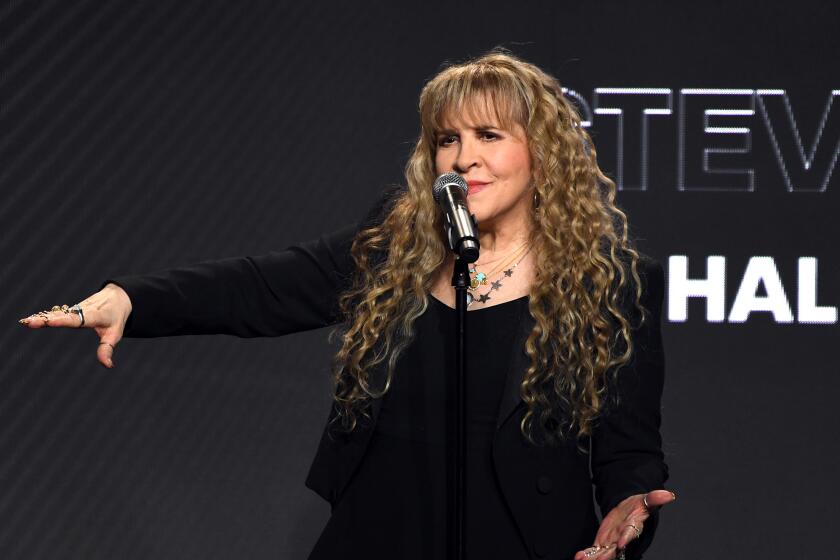‘Last of the True Glamsters’
- Share via
Since this story is about Hollywood rock, it does not begin until the afternoon. The setting is Denny’s on Sunset Strip. Members of a band called Queeny Blast Pop have come to meet with an influential disc jockey--an elfish man, face pale, eyes heavy, hunched over a bowl of oatmeal. “Just woke up,” he croaks.
The four Queeny members and their vaguely attached manager settle around the DJ. They are young men with long, teased hair of many colors--red, green, yellow, black. It’s early for the makeup and silky blouses that provide what they describe, lovingly, as “the look.” They wear shorts, soiled T-shirts, canvas high-tops, and from time to time sniff at themselves, debating who’s gone longest without a shower.
They have come looking for a break, to be interviewed on the air. First, though, the meeting wanders--again, it’s Hollywood. Names drop like palm fronds in the wind. Trends are discussed--the ascent of Seattle grunge rock vs. the decline of their style of Hollywood “glam,” or glamour, rock. Career advice is solicited. “Maybe you need your own bubble gum cards,” the DJ offers.
For my benefit, any remark that approaches praise or even “good color” is repeated by the manager. “Did you catch that quote?” he asks. “He said, ‘They’d be huge in Japan.’ ” Or, “Did you get that? Pepper hasn’t showered in four days. That’s good stuff for you.” Pepper is Pepper Sweet, the band’s 19-year-old drummer and the reason I hooked up with these young peacocks for a day.
*
His father, an old friend, had called to report that the little boy I knew as Adam had moved from Kingsburg to Hollywood, trying his luck. My friend described Queeny’s androgynous hair and costumes, the funny stage names such as “Punky Jean” and “Lil’ Dee,” the hand-to-mouth existence--the hustle. He spoke not as a fearful parent, but as someone who traveled the weird side of the ‘60s himself some and appreciated the adventure, envied it even. “Living the dream,” he called it.
The dream would not progress much at Denny’s. After an hour, Pepper leaned over and asked the disc jockey straight-out: “What about interviewing us on-air?” Bare knees bounced beneath the table, toes twitched. The disc jockey set down his spoon. “Sure,” he said finally. “After you do an album.”
With that, we headed to Pepper’s old van and resumed the day’s business. A loafered impressario-type would promise to put Queeny on his cable rock show--if the band paid him $800. A stop at a girlfriend’s apartment would lead to Pepper’s discovery that he’d been supplanted by another temporary rock-guest. “That’s how it goes in Hollywood,” he said, gathering his clothes. The band’s PO box would be checked for fan mail. “Can you believe it?” Les the bass player said, peering into the empty box.
The band works hard each day. Lipstick, weird hair and nose rings disguise an entrepreneurial flair. The musicians hand-deliver promotional sheets to record stores, sell homemade tapes on the street and pick through predators, meeting by meeting, in a patient hunt for the right promoter. Their rowing against the musical wave by going “glam” is a calculated attempt to stand apart. In a year, Queeny has scored some: solid reviews in the rock press--”the last of the true glamsters,” trumpeted one--a record company nibble.
For now, the band members are resigned to charity, homeless. “We don’t know where we are going to be staying most nights,” Pepper said. “We just keep calling girls we know until we find a place.” They eat one meal a day. This poverty is regarded as healthy--a day job would be a distraction.
Sundown found us in a Vernon warehouse that’s been converted into a vast rehearsal complex. Along the concrete halls, music leaked under steel doors--country, reggae, rock and, from Room 513, Queeny Blast Pop. The band ran twice through its nine-song repertoire, high energy songs about love and music and looking weird but making it anyway. The musicians faced a mirrored wall and would sneak peeks at themselves as they played. They seemed to like what they saw.
*
It was 11 p.m. when I left the boys. They were at a San Fernando Valley club, plotting how to crash a back-room party. How their night would end was as ambiguous to them as it was to me. Driving home, I recalled the vividness with which they described their dream--stadiums swaying to Queeny music, years on the charts, MTV. I asked what it would take, and they spoke of “sticking together,” of “politics” and “the machine,” of “the buzz” and “the breaks.”
I snapped my new Queeny Blast Pop tape into the stereo. It sounded pretty good, but I’m no expert. The music critics, club owners, disc jockeys--people of the machine--they will determine if these musicians, out of thousands, make it. All I know is that Pepper’s pop was right. They are, in their own way and time, living Hollywood’s ageless dream. And that, just in itself, is a bigger break than they can now know.
More to Read
The biggest entertainment stories
Get our big stories about Hollywood, film, television, music, arts, culture and more right in your inbox as soon as they publish.
You may occasionally receive promotional content from the Los Angeles Times.











